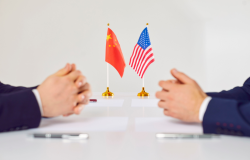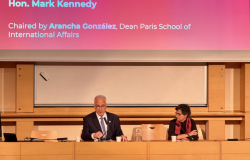Obama-Xi summit not doomed to fail
Will Xi's talks in Washington be a waste of time and that the summit is doomed to fail? The answer is no. Sino-American conflict is not inevitable, and we cannot give up on what is arguably the most important bilateral relationship in the world, writes Ambassador J. Stapleton Roy.

Dark clouds are hanging over this week's state visit by Chinese President Xi Jinping to the United States.
Accusations of Chinese theft of U.S. business secrets and government personnel records have been surging, the two countries are constantly locking horns over rocks and islets in the South China Sea, and now the Chinese have new missiles that threaten U.S. carrier groups in the western Pacific -- as recently paraded through Tiananmen Square.
These frictions are exacerbated on an almost daily basis by American campaign rhetoric, with many U.S. presidential candidates calling for the cancellation or downgrading of the visit itself.
Even more significant, pessimism about the relationship has permeated segments of the China-watching community to a degree not seen in recent years.
A recent book detailed China's so-called secret plan to replace America as the global superpower. The prestigious Council on Foreign Relations published a report by two international relations specialists calling for a new grand strategy that places less emphasis on cooperation and more on pressure and competition with China. One respected Sinologist published an opinion piece arguing that the end game of communist rule in China has begun, while another gave a speech arguing that the relationship was nearing the tipping point.
So, does this mean that Xi's talks in Washington will be a waste of time and that the summit is doomed to fail? The answer is no. Sino-American conflict is not inevitable, and we cannot give up on what is arguably the most important bilateral relationship in the world.
Here are five reasons:
The Cold War is over. Neither China nor the United States will benefit from the re-emergence of a Cold War-type rivalry between the two countries. The goals of wise policy in both countries should be to head off such an outcome, to find ways to limit strategic rivalry and to keep the cooperative aspects of the relationship more dominant than the competitive elements. It is no accident that in the last 44 years, five Republican presidents and three Democratic ones have all concluded that seeking constructive relations with China is in the U.S. national interest.
We're in it for the long haul. As the two principal powers in the Asia-Pacific region, the United States and China will be interacting together, for better or worse, for the indefinite future. U.S. strategy needs a long-term perspective. It should not be thrown off course by the periodic accumulation of difficult issues that inevitably mark relations between two big countries with widely divergent backgrounds and circumstances.
Regional powers have a role. History has shown that the geographic region of East Asia is not conducive to domination by a single country through such hard power tools as military or economic coercion. China may have inherited the geographic position of the central kingdom, but it is surrounded by major powers whose interests would not be served by Chinese hegemony in East Asia.
Moreover, China now must function in a world where its neighbors are as determined to safeguard their sovereignty and territorial integrity as are the leaders in Beijing. China's real strength lies in the soft power it has accumulated through its example of rapid economic development, which gives it the aura of a successful rising power.
China faces a core contradiction. The fundamental contradiction facing China's leaders is that they are attempting to modernize China while retaining a pre-modern form of governance. The more China modernizes, the more acute this contradiction will become.
The current repression in China is a reflection of this contradiction. This is China's domestic challenge. The United States cannot be indifferent to this struggle, but it cannot determine the outcome. Americans must ask themselves: Will our influence be greater within a hostile relationship or within a cooperative one?
China is not ours to transform. U.S. policy toward China is, and always has been, grounded on national interest and not on naive assumptions that engagement with Beijing would in a few short decades transform it into a liberal democracy. The Chinese are as resistant to interference in their internal affairs and government structures as we are. The transformation of China rests in Chinese hands, not ours.
This is why summits are essential. In good times and bad, they permit face-to-face communication at the highest level. They are action-forcing events that energize leaders and bureaucracies to seek opportunities to expand cooperation and manage differences more effectively.
Summits are not without risk, especially for impetuous leaders prone to jump to conclusions, as happened when Soviet leader Nikita Khrushchev grossly underestimated U.S. President John F. Kennedy in their first meeting in 1961. Yet such occurrences are the exception, not the rule, and both Xi and U.S. President Barack Obama are seasoned leaders who understand the importance of getting the U.S.-China relationship right.
In the end, Xi's state visit will involve both substance and ceremony. By according him the dignified welcome appropriate for the leader of the world's most populous country, Americans will set a positive tone for the summit. And a productive outcome will advance the interests of both countries, while paving the way for a better future.
About the Author

J. Stapleton Roy
Founding Director Emeritus, Kissinger Institute on China and the United States

Kissinger Institute on China and the United States
The Kissinger Institute works to ensure that China policy serves American long-term interests and is founded in understanding of historical and cultural factors in bilateral relations and in accurate assessment of the aspirations of China’s government and people. Read more











